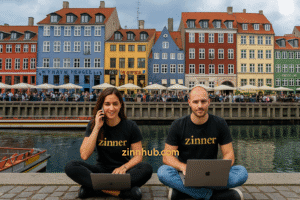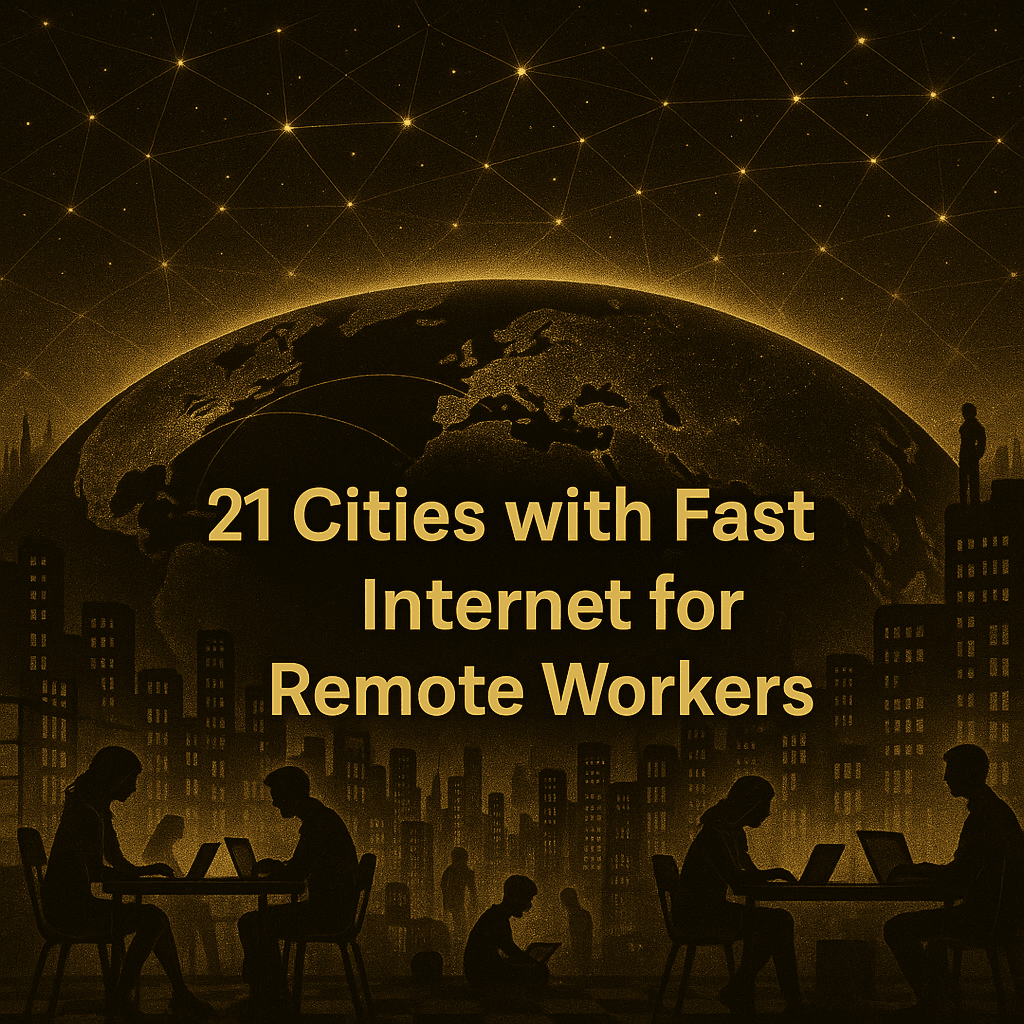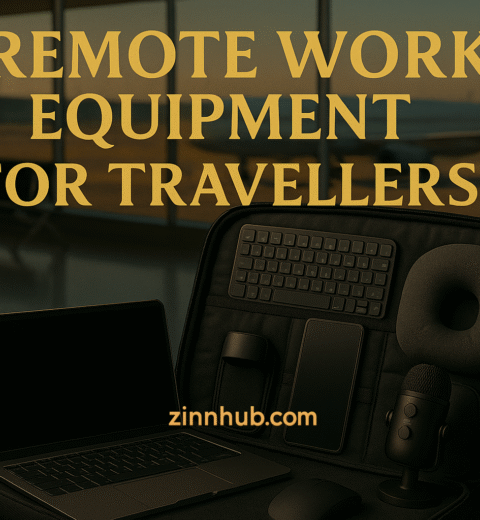Table of Contents
- 1. Dubai, UAE
- 2. Singapore, Southeast Asia
- 3. Hong Kong, China
- 4. Santiago, Chile
- 5. New York, USA
- 6. Bangkok, Thailand
- 7. Paris, France
- 8. Copenhagen, Denmark
- 9. Madrid, Spain
- 10. Lisbon, Portugal
- 11. Taipei, Taiwan
- 12. Seoul, South Korea
- 13. Tokyo, Japan
- 14. Tallinn, Estonia
- 15. Prague, Czech Republic
- 16. Budapest, Hungary
- 17. Chiang Mai, Thailand
- 18. Medellín, Colombia
- 19. Helsinki, Finland
- 20. Bucharest, Romania
- Share Your Experiences
Choosing where to work remotely isn’t just about warm weather and pretty views. For most of us, a stable, fast internet connection is the real non-negotiable. After all, it doesn’t matter how inspiring the scenery is if your video call keeps freezing. This guide pulls together 21 cities from around the world that stand out not just for their fast internet or digital infrastructure but for the overall quality of life they offer remote workers.
Whether you’re freelancing, running your own business, or just need a change of pace, these places combine solid connectivity with vibrant communities and great everyday living – the kind of spots where you can actually get work done and enjoy where you are.
1. Dubai, UAE
Dubai has quickly become a go-to spot for remote workers who want both comfort and performance.
With no income tax, cutting-edge infrastructure, and a location that bridges East and West, it’s easy to see why digital professionals are setting up shop here. Dubai’s remote work visa makes it easier than ever to stay longer and actually settle in. One week you’re setting up your laptop in a glass-walled high-rise, the next you’re taking a call just steps from the beach. It’s a place where you can genuinely get work done without giving up the perks of great weather, global food, and a mix of cultures that keeps everyday life interesting.
- Average Internet Speed: 295-300 Mbps
- Fiber Availability: Extensive coverage throughout the city; nearly all residential buildings in popular expat areas have fiber access
- Internet Provider Competition: 2 major providers (Etisalat and Du); government-regulated duopoly
- Public WiFi Availability: Excellent coverage in public spaces, malls, and tourist areas
- Public WiFi Security: Most public networks require registration with a mobile number; generally secure
- Internet Reliability: Extremely reliable with minimal outages; 99.9% uptime
- Power Stability: Exceptional; power outages are extremely rare
- Mobile Data Options/Costs: Moderately expensive; ~$30-50 for monthly plans with good data allowances
- 5G Coverage: Nearly complete coverage in urban areas, one of the world’s most advanced 5G networks
- VPN Performance: Legal VPNs work efficiently, though some VoIP services are restricted
- Co-working WiFi Quality: Excellent; most spaces offer 200+ Mbps connections
- Installation Wait Time: Fast; typically 2-5 business days
- Contract Flexibility: Improving; 3-month packages becoming available but 12-month contracts still common
- Internet Censorship Level: Moderate; some content and VoIP services are blocked
- Communication Apps Status: Restricted; WhatsApp messages work but calls blocked; Skype calls blocked; FaceTime blocked; Zoom and Microsoft Teams generally permitted for business use
- Digital Nomad Community Size: Growing rapidly, with new visa programs attracting remote workers

2. Singapore, Southeast Asia
It is easy to understand why Singapore is frequently regarded as Asia’s standard for digital infrastructure. Its incredibly effective systems, high degree of safety, and easy daily living attract remote workers. Singapore, a contemporary, multicultural city that serves as a commercial hub for the rest of Asia, provides a special fusion of opportunity and order. Although living expenses can be high, many digital nomads find that the trade-off is worthwhile. You get blazing-fast internet, spotless streets, world-class transport, and an incredible food scene that reflects the city’s rich cultural blend. Plus, you’re perfectly positioned to hop over to nearby countries whenever wanderlust strikes.
- Average Internet Speed: 290-300 Mbps
- Fiber Availability: Near-universal fiber coverage in residential and commercial buildings
- Internet Provider Competition: 3 major providers with strong competition (Singtel, StarHub, M1)
- Public WiFi Availability: Excellent coverage with government-sponsored Wireless@SG available in most public areas
- Public WiFi Security: Very secure with SingPass authentication; government-managed networks
- Internet Reliability: Exceptional reliability with redundant infrastructure; 99.9% uptime
- Power Stability: Excellent; essentially no power outages
- Mobile Data Options/Costs: Competitive prices for tourists and residents; ~$15-25 for good data packages
- 5G Coverage: Extensive coverage throughout the small city-state with continuous improvements
- VPN Performance: Excellent with no restrictions; ideal for accessing global content
- Co-working WiFi Quality: Superb; most spaces offer fiber connections with 250+ Mbps
- Installation Wait Time: Very fast; typically 1-3 business days
- Contract Flexibility: Good options for shorter-term plans; 3-6 month contracts available
- Internet Censorship Level: Low; some adult content is blocked but otherwise minimal restrictions
- Communication Apps Status: Unrestricted; all major communication apps and VoIP services work normally including WhatsApp, Skype, FaceTime, Zoom, and others
- Digital Nomad Community Size: Large, with numerous co-working spaces and tech-focused communities

3. Hong Kong, China
Hong Kong continues to attract remote workers because of something unique about it. Perhaps it is the way the city combines the vigour of the East with the speed and accuracy of the West. Or perhaps it is the ease with which tradition and contemporary living coexist in this city. For those in finance or tech, it’s a dream base—think ultra-fast internet, a super-efficient transit system, and all the perks of a major global business hub. But here’s what surprises a lot of people: despite being one of the densest cities in the world, it’s actually easy to escape into nature. You’ve got hiking trails with ocean views, quiet islands just a ferry ride away, and plenty of green pockets to unwind. And when the laptop is closed for the day, get ready to eat. From street-side noodle stalls to Michelin-starred dining, the food scene is next-level. And if you’re up for a night out, spots like Lan Kwai Fong keep the vibe alive well into the early hours.
- Average Internet Speed: 275-285 Mbps
- Fiber Availability: Excellent coverage in all developed areas; nearly all buildings have fiber access
- Internet Provider Competition: 3 main providers (HKT, HKBN, China Mobile); healthy competition
- Public WiFi Availability: Excellent coverage in commercial areas and public spaces
- Public WiFi Security: Free government WiFi.HK program with respectable security; commercial WiFi often requires registration
- Internet Reliability: Very reliable with minimal outages
- Power Stability: Excellent; power outages are extremely rare
- Mobile Data Options/Costs: Moderately priced; ~$20-30 for good data packages
- 5G Coverage: Comprehensive coverage across the territory with fast expansion
- VPN Performance: Excellent and unrestricted; widely used for accessing global content
- Co-working WiFi Quality: Very high; most spaces offer 200+ Mbps connections
- Installation Wait Time: Efficient; typically 2-4 business days
- Contract Flexibility: Decent; 6-month contracts available but 12-month more common
- Internet Censorship Level: Currently low, though increasing concerns about potential changes
- Communication Apps Status: Unrestricted; all major communication apps and VoIP services work normally, including WhatsApp, Skype, FaceTime, Telegram, and Signal
- Digital Nomad Community Size: Medium, concentrated in specific neighborhoods

4. Santiago, Chile
Santiago is quickly carving out a name for itself as South America’s rising tech capital – and it’s easy to see why remote workers are paying attention. The city blends sleek, modern living with a laid-back charm that’s hard to resist. You get the perks of a major metropolis – fast internet, coworking spaces, a growing startup culture – while being just a short trip from jaw-dropping nature. One weekend you could be hiking in the Andes, the next sipping wine in a sun-drenched vineyard or catching ocean views on the Pacific coast. It’s that rare balance of urban energy and outdoor freedom. Add in Chile’s political stability, Santiago’s clean and well-organised vibe, and a climate that stays pleasantly moderate year-round, and you’ve got a place that’s not just liveable—but genuinely enjoyable. Whether you’re after good coffee, great wine, or just a reliable spot to work remotely with a view, Santiago has you covered.
- Average Internet Speed: 260-265 Mbps
- Fiber Availability: Widely available in metropolitan areas; one of the best fiber networks in Latin America
- Internet Provider Competition: Several providers (VTR, Movistar, Entel, Claro); good competition
- Public WiFi Availability: Good in business districts and tourist areas
- Public WiFi Security: Variable; government-sponsored networks require registration
- Internet Reliability: Generally reliable in central districts
- Power Stability: Good in central areas; occasional brief outages during winter
- Mobile Data Options/Costs: Reasonably priced; ~$15-25 for monthly plans
- 5G Coverage: Growing rapidly in main urban areas; already comprehensive in Santiago
- VPN Performance: Works well with no restrictions
- Co-working WiFi Quality: Excellent; most spaces offer 150-200+ Mbps connections
- Installation Wait Time: Average; typically 3-7 business days
- Contract Flexibility: Improving; 6-month contracts available but annual contracts standard
- Internet Censorship Level: Very low; open internet with minimal restrictions
- Communication Apps Status: Unrestricted; all major communication apps and VoIP services work normally
- Digital Nomad Community Size: Growing, with several emerging co-working hubs

5. New York, USA
Despite its high expenses, New York City still attracts remote workers because of its unimaginable energy and professional networking opportunities. The city showcases access to investors, entrepreneurs, and additional creative thinkers in virtually all industries since it is the cultural and financial centre of the United States. Remote workers are drawn to New York’s diverse neighbourhoods, world-class entertainment, museums, restaurants, and the constant pulse of activity. The explosion of co-working spaces throughout Manhattan and Brooklyn has made finding productive work environments easier, while the city’s vibrant social scene ensures remote workers never lack for after-hours stimulation.
- Average Internet Speed: 240-245 Mbps
- Fiber Availability: Extensive in Manhattan and parts of Brooklyn/Queens; expanding in outer boroughs
- Internet Provider Competition: Several major providers (Verizon Fios, Spectrum, RCN, Optimum); varies by neighborhood
- Public WiFi Availability: Excellent in commercial areas, coffee shops, and public spaces
- Public WiFi Security: Variable; free public networks often unsecured, paid options better
- Internet Reliability: Very reliable in business districts and newer residential areas
- Power Stability: Very good; rare outages except during major weather events
- Mobile Data Options/Costs: Expensive; ~$50-80 for unlimited data plans
- 5G Coverage: Extensive in Manhattan and parts of other boroughs; rapidly expanding
- VPN Performance: Excellent with no restrictions
- Co-working WiFi Quality: Top-tier; most spaces offer 300+ Mbps connections
- Installation Wait Time: Variable; can range from 2 days to 2 weeks depending on provider and building
- Contract Flexibility: Good options for month-to-month plans, especially from newer providers
- Internet Censorship Level: Very low; open internet
- Communication Apps Status: Unrestricted; all major communication apps and VoIP services work normally
- Digital Nomad Community Size: Very large, with numerous co-working spaces and communities

6. Bangkok, Thailand
Digital nomads have long been drawn to Bangkok, and it makes sense. The city somehow finds the ideal balance between affordability and contemporary convenience. You have a vibrant street life and historic temples nestled between modern glass skyscrapers. For remote workers, it is a way of life rather than just a place to work. Because living expenses are so low, activities like relaxing by a rooftop pool or getting a massage after work become regular occurrences rather than occasional indulgences. Its central location in Southeast Asia also makes quick weekend escapes to tropical beaches or mountain towns completely feasible. The food? Let’s just say it deserves every bit of the hype. And if you’re new to town, don’t worry; between the buzzing coworking spaces and friendly expat communities, finding your people isn’t hard at all.
- Average Internet Speed: 230-235 Mbps
- Fiber Availability: Excellent in central districts; widely available throughout the city
- Internet Provider Competition: Several providers (AIS, True, 3BB, TOT); healthy competition
- Public WiFi Availability: Widely available in malls, cafés, and co-working spaces
- Public WiFi Security: Variable; mall networks generally secure, café networks less so
- Internet Reliability: Reliable in central areas; occasional outages during rainy season
- Power Stability: Good in central business areas; occasional brief outages elsewhere
- Mobile Data Options/Costs: Very affordable; ~$15-20 for monthly unlimited plans
- 5G Coverage: Well-established in central Bangkok; expanding rapidly
- VPN Performance: Works well; useful for accessing some region-restricted content
- Co-working WiFi Quality: Excellent; most spaces offer 150-200+ Mbps connections
- Installation Wait Time: Fast in condos popular with expats; typically 2-5 business days
- Contract Flexibility: Good; monthly contracts widely available, especially for condos
- Internet Censorship Level: Moderate; some political content restricted
- Communication Apps Status: Mostly unrestricted; all major communication apps generally work, though occasional disruptions during political unrest
- Digital Nomad Community Size: Very large, one of Asia’s most established nomad hubs

7. Paris, France
For remote workers who want more than just a place to plug in their laptop, Paris has a unique appeal. It is not only about finishing tasks; it is also about doing so in an environment where every street corner seems like a scene from a film. The city provides the kind of daily inspiration that is difficult to find elsewhere thanks to its romantic ambiance, famous architecture, and countless cultural treasures.
Paris has subtly adjusted to the remote work lifestyle in recent years. While maintaining the city’s classic charm, there are now plenty of chic co-working spaces and cafés that genuinely invite you to stay and work. Although living here is not the most affordable option, many digital nomads believe the trade-off is worthwhile. The benefits are numerous, including easy weekend travel to almost any location in Europe, walkable neighbourhoods, and dependable public transportation. Include the cuisine (naturally), the artwork, the people-watching, etc., and all of a sudden, working remotely in Paris feels more like a dream than a job.
- Average Internet Speed: 220-225 Mbps
- Fiber Availability: Excellent coverage with extensive fiber-optic infrastructure
- Internet Provider Competition: Several providers (Orange, Free, SFR, Bouygues); strong competition
- Public WiFi Availability: Good coverage in commercial areas and many cafés
- Public WiFi Security: Variable; government networks relatively secure, café networks less so
- Internet Reliability: Reliable in most areas of the city
- Power Stability: Excellent; rare outages
- Mobile Data Options/Costs: Moderate EU plans around €20-30 for good data packages
- 5G Coverage: Widespread in central Paris and expanding to suburbs
- VPN Performance: Works well with no restrictions
- Co-working WiFi Quality: Very good; most spaces offer 150-200+ Mbps connections
- Installation Wait Time: Average; typically 1-2 weeks
- Contract Flexibility: Improving; shorter contracts becoming available but 12-month still common
- Internet Censorship Level: Low; some restrictions on hate speech and illegal content
- Communication Apps Status: Unrestricted; all major communication apps and VoIP services work normally
- Digital Nomad Community Size: Large, with strong expat community

8. Copenhagen, Denmark
Copenhagen is among the cities that just give life a sense of balance and fulfilment. Clean, calm, and well planned, it is the kind of city where everything just works and people seem to be genuinely happy. For remote workers who value more than just crossing things off their to-do list, it is a desirable option. From the countless bike lanes to the welcoming cafés that beckon you to take your time and savour the moment, everything about this place seems to be designed with people, not cars, in mind. Hygge, as it is known in Denmark, is more than just a trendy term; it is a way of life. There’s a quiet comfort in the way locals make time for simple pleasures. Yes, it’s pricey. But for many digital nomads, the tradeoff is worth it. You’re getting top-tier public services, a deeply sustainable lifestyle, and a culture that takes work-life balance seriously. Plus, it’s hard to argue with living in a country that consistently ranks among the happiest in the world.
- Average Internet Speed: 215-220 Mbps
- Fiber Availability: Nearly complete coverage with advanced fiber network
- Internet Provider Competition: Several companies (TDC, Telenor, Telia); robust competition
- Public WiFi Availability: Excellent coverage in public spaces and commercial areas
- Public WiFi Security: Good; major public networks use standard security protocols
- Internet Reliability: Extremely reliable with minimal disruptions
- Power Stability: Excellent; outages extremely rare
- Mobile Data Options/Costs: Moderate EU plans around €25-35 for good data allowances
- 5G Coverage: Extensive coverage in Greater Copenhagen area
- VPN Performance: Excellent with no restrictions
- Co-working WiFi Quality: Exceptional; spaces routinely offer 200-300+ Mbps connections
- Installation Wait Time: Fast; typically 2-5 business days
- Contract Flexibility: Good; 3-6 month contracts available
- Internet Censorship Level: Very low; mostly unrestricted
- Communication Apps Status: Unrestricted; all major communication apps and VoIP services work normally
- Digital Nomad Community Size: Medium, with growing tech presence

9. Madrid, Spain
Madrid has quietly become a favourite for remote workers craving culture, sunshine, and a slower pace — without the sky-high price tag of other European capitals for digital nomads. Life here moves to its own rhythm, with long lunches, late-night dinners, and the occasional siesta offering a welcome break from the grind. It’s a city where work doesn’t have to take over your life. You’ve got warm weather most of the year, stunning parks to work or unwind in, and an unbeatable mix of art, food, and nightlife just outside your door. Additionally, it is even simpler to stay for a while with Spain’s new digital nomad visa. Madrid is also a fantastic starting point for exploration because everything is close by, whether you are looking for a quick trip to another European city or a weekend by the sea. For many, it is the ideal balance of enjoyment and productivity.
- Average Internet Speed: 205-210 Mbps
- Fiber Availability: Excellent; Spain has one of Europe’s most extensive fiber networks
- Internet Provider Competition: Multiple providers (Movistar, Vodafone, Orange, MásMóvil); good competition
- Public WiFi Availability: Good coverage in central areas and tourist districts
- Public WiFi Security: Variable; city-operated networks generally more secure
- Internet Reliability: Reliable fiber infrastructure in most central areas
- Power Stability: Very good; rare outages
- Mobile Data Options/Costs: Affordable EU plans around €15-25 for good data packages
- 5G Coverage: Well-established in Madrid with continuous expansion
- VPN Performance: Works well with no restrictions
- Co-working WiFi Quality: Very good; most spaces offer 150-200+ Mbps connections
- Installation Wait Time: Average; typically 5-10 business days
- Contract Flexibility: Improving with more short-term options, but 12-month contracts still standard
- Internet Censorship Level: Low; some political content related to Catalonia may be restricted
- Communication Apps Status: Unrestricted; all major communication apps and VoIP services work normally
- Digital Nomad Community Size: Large and growing, supported by Spain’s digital nomad visa

10. Lisbon, Portugal
Lisbon has rapidly risen as Europe’s digital nomad capital, offering an irresistible combination of affordability, beauty, and lifestyle quality. The city’s sun-drenched hills, historic trams, and colourful tiled buildings provide a picturesque setting that inspires creativity. Lisbon’s strategic position on the Atlantic gives it mild winters and cooling sea breezes during summer, making it comfortable year-round. The government’s digital nomad visa and favourable tax schemes have attracted a thriving international community, while the local culture emphasises enjoying life at a relaxed pace. With excellent surfing beaches nearby, a vibrant café culture, and some of Europe’s lowest living costs, Lisbon presents an ideal work-life balance.
- Average Internet Speed: 160-180 Mbps
- Fiber Availability: Good in central districts; expanding rapidly throughout the city
- Internet Provider Competition: Several options (MEO, NOS, Vodafone); healthy competition
- Public WiFi Availability: Good coverage in tourist areas and many cafés
- Public WiFi Security: Variable; municipal WiFi requires registration
- Internet Reliability: Reliable in central districts; occasional issues in older buildings
- Power Stability: Good; occasional brief outages in older neighborhoods
- Mobile Data Options/Costs: Affordable EU plans around €10-20 for good data packages
- 5G Coverage: Good coverage in central Lisbon; expanding outward
- VPN Performance: Works well with no restrictions
- Co-working WiFi Quality: Very good; most spaces offer 100-150+ Mbps connections
- Installation Wait Time: Average; typically 5-10 business days
- Contract Flexibility: Improving; 6-month contracts becoming more common
- Internet Censorship Level: Very low; open internet
- Communication Apps Status: Unrestricted; all major communication apps and VoIP services work normally
- Digital Nomad Community Size: Large and rapidly growing, with numerous dedicated communities and events

11. Taipei, Taiwan
Taipei is one of those rare cities that just works – and still manages to feel warm, welcoming, and full of character. For remote workers, it hits a sweet spot: super safe, incredibly clean, and home to one of the most efficient public transport systems you’ll ever use. However, convenience is not the only contributory factor. There is soul in the city. There is always something new to explore, from lively night markets and quirky coffee shops to its distinctive fusion of indigenous, Japanese, and Chinese culture. Additionally, the mountains are nearby, making them ideal for a quick walk or a hot spring soak when you need a break from the digital screen. Better still? Because of its prominence in the global tech scene, Taipei has excellent tech infrastructure, friendly locals, and surprisingly low prices. It is a simple and rewarding way for many digital nomads to travel throughout East Asia.
- Average Internet Speed: 160-180 Mbps
- Fiber Availability: Excellent coverage throughout the city
- Internet Provider Competition: Several providers (Chunghwa Telecom, Taiwan Mobile, FarEasTone); good competition
- Public WiFi Availability: Excellent coverage with government iTaiwan free WiFi in many locations
- Public WiFi Security: Generally good; iTaiwan network requires registration
- Internet Reliability: Very reliable with minimal outages
- Power Stability: Very good; rare outages
- Mobile Data Options/Costs: Affordable plans around $20-30 for generous data packages
- 5G Coverage: Extensive coverage in Taipei; one of Asia’s most advanced networks
- VPN Performance: Excellent with no restrictions
- Co-working WiFi Quality: Very good; most spaces offer 100-150+ Mbps connections
- Installation Wait Time: Fast; typically 3-5 business days
- Contract Flexibility: Mixed; prepaid options available but contracts often 12 months
- Internet Censorship Level: Very low; open internet
- Communication Apps Status: Unrestricted; all major communication apps and VoIP services work normally
- Digital Nomad Community Size: Medium, growing steadily with strong tech community

12. Seoul, South Korea
Seoul attracts remote workers with its perfect fusion of hyper-modernity and deep-rooted traditions. The city’s technological advancement is evident everywhere – from its lightning-fast internet to its futuristic architecture and cutting-edge fashion. Digital nomads appreciate Seoul’s 24-hour culture, where you can work, shop, eat, or exercise at any hour in complete safety. The efficient public transportation system makes navigating this vast metropolis simple, while nearby mountains offer surprising natural retreats. Seoul’s distinct neighbourhoods each have unique characteristics, from the traditional hanok houses of Bukchon to the artistic vibes of Hongdae, giving remote workers plenty to explore during their stay.
- Average Internet Speed: 150-160 Mbps (fixed broadband)
- Fiber Availability: Excellent coverage throughout metropolitan Seoul
- Internet Provider Competition: Three major providers (KT, SK Broadband, LG U+); healthy competition
- Public WiFi Availability: Extensive free WiFi throughout the city, including subway stations
- Public WiFi Security: Good; most networks use basic security protocols
- Internet Reliability: Extremely reliable with minimal outages; high uptime
- Power Stability: Excellent; power outages are extremely rare
- Mobile Data Options/Costs: Affordable plans with fast mobile internet (~200 Mbps mobile)
- 5G Coverage: One of the world’s most advanced 5G networks; near-complete urban coverage
- VPN Performance: Generally good; some services may be restricted
- Co-working WiFi Quality: Excellent; spaces typically offer 100-200+ Mbps connections
- Installation Wait Time: Fast; typically 1-3 business days
- Contract Flexibility: Limited; 12-month contracts are standard
- Internet Censorship Level: Moderate; some North Korea-related content is blocked
- Communication Apps Status: Mostly unrestricted; most communication apps work normally, though some North Korean or Chinese apps may be restricted
- Digital Nomad Community Size: Medium-large, with several established communities and meetups

13. Tokyo, Japan
Tokyo fascinates remote workers with its seamless blend of centuries-old traditions and futuristic innovation. The city’s legendary efficiency extends from its transportation systems to its working spaces, creating an environment where productivity feels natural. Digital nomads are drawn to Tokyo’s distinctive neighbourhoods, each offering different atmospheres—from the neon energy of Shinjuku to the creative bohemian vibes of Shimokitazawa. Despite being one of the world’s largest cities, Tokyo maintains exceptional cleanliness, safety, and organisation. The food scene alone attracts culinary-minded remote workers, with more Michelin-starred restaurants than any other city alongside affordable street food and incredible convenience stores.
- Average Internet Speed: 135-145 Mbps
- Fiber Availability: Excellent in central Tokyo; widely available
- Internet Provider Competition: Several providers (NTT, KDDI, Softbank); adequate competition
- Public WiFi Availability: Good coverage in business districts and tourist areas
- Public WiFi Security: Variable; railway and government WiFi generally secure
- Internet Reliability: Very reliable infrastructure with rare outages
- Power Stability: Excellent; power outages extremely rare
- Mobile Data Options/Costs: Tourist SIMs available but relatively expensive
- 5G Coverage: Extensive throughout Tokyo; rapidly expanding
- VPN Performance: Works well with no restrictions
- Co-working WiFi Quality: Very good; spaces typically offer 100-150+ Mbps connections
- Installation Wait Time: Can be slow; typically 2-3 weeks
- Contract Flexibility: Limited; most contracts are 12-24 months with cancellation fees
- Internet Censorship Level: Very low; minimal restrictions
- Communication Apps Status: Unrestricted; all major communication apps and VoIP services work normally
- Digital Nomad Community Size: Medium, concentrated in areas like Shibuya and Shinjuku

14. Tallinn, Estonia
For remote workers, Tallinn may be one of Europe’s best-kept secrets. It is the meeting point of cutting-edge digital innovation and mediaeval charm, and somehow, it all works out expertly. With its tech-savvy, startup-friendly atmosphere, Tallinn is at the forefront of Estonia’s e-Residency programme, which made the country famous for digital nomads. Wander through the cobbled streets of the Old Town — a UNESCO site straight out of a fairytale — and you’ll still be within reach of modern co-working spaces, high-speed internet, and a government that does almost everything online. Tallinn’s small size makes it easy to get around, but it still packs in the perks of a much bigger city. The cost of living is manageable by European standards, the international community is growing fast, and when you need a change of scene, Helsinki is just a short ferry ride away. It’s a place where tradition and tech truly coexist — and that makes it a pretty compelling base for remote life.
- Average Internet Speed: 130-150 Mbps
- Fiber Availability: Excellent throughout the city; government-prioritised infrastructure
- Internet Provider Competition: Several providers (Telia, Elisa, STV); good competition
- Public WiFi Availability: Excellent free WiFi coverage throughout the Old Town and business districts
- Public WiFi Security: Good; city networks use standard security protocols
- Internet Reliability: Very reliable with government emphasis on digital infrastructure
- Power Stability: Very good; rare outages
- Mobile Data Options/Costs: Affordable EU-compatible plans around €15-25 for generous data packages
- 5G Coverage: Excellent in central Tallinn; expanding to suburbs
- VPN Performance: Excellent with no restrictions
- Co-working WiFi Quality: Very good; spaces typically offer 100-150+ Mbps connections
- Installation Wait Time: Fast; typically 2-5 business days
- Contract Flexibility: Good; 3-6 month contracts available
- Internet Censorship Level: Very low; Estonia has one of the world’s most open internets
- Communication Apps Status: Unrestricted; all major communication apps and VoIP services work normally
- Digital Nomad Community Size: Medium, bolstered by Estonia’s e-Residency program and digital nomad visa

15. Prague, Czech Republic
Prague entices remote workers with its fairy-tale architecture and surprisingly affordable European lifestyle. The city’s stunning medieval centre, complete with castle views and cobblestone streets, provides an inspirational backdrop for creative professionals. Digital nomads appreciate Prague’s central European location, which makes weekend trips to neighbouring countries easy and affordable. The city’s compact size, pedestrian-friendly layout, and first-rate public transportation make it possible to live comfortably without a car. Prague offers plenty of chances to relax after work because of its well-known beer culture, large green areas, and year-round cultural events.
- Average Internet Speed: 130-150 Mbps
- Fiber Availability: Very good in central areas; expanding throughout the city
- Internet Provider Competition: Several providers (O2, T-Mobile, Vodafone); healthy competition
- Public WiFi Availability: Good coverage in tourist areas and most cafés
- Public WiFi Security: Variable; tourist area networks often less secure
- Internet Reliability: Very reliable in central districts and business areas
- Power Stability: Very good; rare outages
- Mobile Data Options/Costs: Reasonable EU plans around €15-25 for good data packages
- 5G Coverage: Good in central Prague; expanding outward
- VPN Performance: Works well with no restrictions
- Co-working WiFi Quality: Very good; spaces typically offer 100-150+ Mbps connections
- Installation Wait Time: Average; typically 5-10 business days
- Contract Flexibility: Improving; 6-month contracts available
- Internet Censorship Level: Very low; minimal restrictions
- Communication Apps Status: Unrestricted; all major communication apps and VoIP services work normally
- Digital Nomad Community Size: Medium-large with established expat community

16. Budapest, Hungary
Budapest has become a favourite among remote workers looking for style, substance, and serious value for money. Often called the Paris of the East, it serves up grand architecture, rich culture, and a lively social scene — all without the steep price tag of Western Europe. Budapest’s distinct atmosphere is what truly makes it stand out. The city is literally divided in half, with Pest’s vibrant co-working spaces, nightlife, and cafés on one side of the Danube and Buda’s serene streets and verdant hills on the other. The contrast gives the city a dynamic rhythm that’s hard to find elsewhere. Add in the steamy thermal baths that locals still frequent, and the ruin bars — those effortlessly cool hangouts tucked into crumbling old buildings — and you’ve got a place that feels both lived-in and full of surprises. In addition, Budapest offers dependable public transport, a vibrant startup scene, and an excellent starting point for short trips throughout Europe. It is the kind of place where everything just falls into place for digital nomads: it is inspiring, useful, and just has a sufficient amount of magic.
- Average Internet Speed: 120-140 Mbps
- Fiber Availability: Very good in central districts; one of Eastern Europe’s best networks
- Internet Provider Competition: Several providers (Magyar Telekom, Digi, Vodafone); robust competition
- Public WiFi Availability: Good coverage in central districts and cafés
- Public WiFi Security: Variable; cafe networks often minimally secured
- Internet Reliability: Reliable in most areas; occasional issues in older buildings
- Power Stability: Good; occasional brief outages in older districts
- Mobile Data Options/Costs: Affordable EU plans around €10-20 for good data packages
- 5G Coverage: Good in central Budapest; expanding to outer districts
- VPN Performance: Works well with no restrictions
- Co-working WiFi Quality: Good; spaces typically offer 80-120+ Mbps connections
- Installation Wait Time: Average; typically 5-10 business days
- Contract Flexibility: Improving; 6-month contracts becoming more available
- Internet Censorship Level: Low; minimal restrictions
- Communication Apps Status: Unrestricted; all major communication apps and VoIP services work normally
- Digital Nomad Community Size: Medium, with growing communities in Districts V, VI, and VII

17. Chiang Mai, Thailand
Chiang Mai has earned its reputation as the original digital nomad hub by offering an unbeatable combination of extremely low costs and rich cultural experiences. This ancient northern Thai city nestled among mountains provides a tranquil alternative to Bangkok’s chaos, with its hundreds of temples, walkable old city, and relaxed pace of life. There’s a reason so many remote workers end up sticking around in Chiang Mai. The city has everything you need to get things done – plenty of co-working spots, relaxed cafés where no one minds if you hang around with your laptop, and a big international crowd that regularly puts on casual meetups and social events. One of the biggest draws: you don’t need a huge income to live comfortably. With the exchange rate in your favour, things like eating out, spa days, or renting a nice place suddenly feel pretty affordable. And when the weekend rolls around, it’s easy to hop on a scooter and head for the hills – the mountains nearby are perfect for hiking or just clearing your head.
- Average Internet Speed: 90-120 Mbps
- Fiber Availability: Good in central Chiang Mai, particularly Nimman area
- Internet Provider Competition: Several providers (AIS, True, 3BB); adequate competition
- Public WiFi Availability: Widely available in cafés, malls, and co-working spaces
- Public WiFi Security: Variable; co-working spaces secure, café networks less so
- Internet Reliability: Generally reliable in central areas; occasional outages during rainy season
- Power Stability: Decent; occasional outages during monsoon season
- Mobile Data Options/Costs: Very affordable; ~$15-20 for monthly unlimited plans
- 5G Coverage: Available in central areas; expanding
- VPN Performance: Works well; useful for accessing some region-restricted content
- Co-working WiFi Quality: Very good; spaces typically offer 80-100+ Mbps connections
- Installation Wait Time: Variable; can be quick in areas popular with expats
- Contract Flexibility: Good; month-to-month options common in nomad-friendly buildings
- Internet Censorship Level: Moderate; some political content restricted
- Communication Apps Status: Mostly unrestricted; all major communication apps generally work, though occasional disruptions during political unrest
- Digital Nomad Community Size: Very large, one of the world’s most established digital nomad hubs

18. Medellín, Colombia
Medellín has come a long way – and these days, it has developed into one of the most well-liked destinations in South America for digital nomads. Set in a lush valley surrounded by green mountains, the city enjoys near-perfect weather all year round. With average temperatures around 22°C (72°F), there’s no need for heating or AC – just open the window and enjoy the breeze. What really stands out, though, is how liveable the city feels. The metro is clean and reliable, and the cable cars that connect the hillside neighbourhoods offer some of the best views you’ll get on your daily commute. Add to that a low cost of living, buzzing nightlife (especially around El Poblado), and some of the friendliest locals you’ll ever meet — the Paisas — and it’s easy to see why so many remote workers end up staying longer than planned.
- Average Internet Speed: 80-100 Mbps
- Fiber Availability: Good in El Poblado and Laureles; expanding to other neighborhoods
- Internet Provider Competition: Several providers (Claro, Tigo, Movistar); decent competition
- Public WiFi Availability: Good in El Poblado and Laureles areas; variable elsewhere
- Public WiFi Security: Variable; mall and commercial networks generally more secure
- Internet Reliability: Generally reliable in newer buildings and dedicated workspaces
- Power Stability: Improving; occasional brief outages during rainy season
- Mobile Data Options/Costs: Affordable; ~$15-25 for monthly plans with good data allowances
- 5G Coverage: Available in upscale neighborhoods; expanding
- VPN Performance: Works well with no restrictions
- Co-working WiFi Quality: Good; spaces typically offer 50-80+ Mbps connections
- Installation Wait Time: Average; typically 5-10 business days
- Contract Flexibility: Limited for traditional contracts; month-to-month available in nomad-focused buildings
- Internet Censorship Level: Very low; minimal restrictions
- Communication Apps Status: Unrestricted; all major communication apps and VoIP services work normally
- Digital Nomad Community Size: Large and established, especially in El Poblado neighborhood

19. Helsinki, Finland
Helsinki is a top choice for remote workers looking for dependability and speed because it blends Nordic efficiency with state-of-the-art technology. Helsinki doesn’t shout for attention – but for remote workers who value calm, clarity, and high-tech convenience, it quietly delivers. The result is a city where things just work. Finland’s capital is now among the most connected cities in Europe thanks to its dedication to digital infrastructure. A strong work-life balance culture, large green areas, and functional design combine to create the perfect setting for digital productivity. Even though living expenses are high, remote workers looking for stability and creativity in a safe, clean city will find great value in the high calibre of public services and digital infrastructure.
- Average Internet Speed: 250-300 Mbps
- Fiber Availability: Widespread coverage across the city; approximately 85% of properties have fiber access
- Internet Provider Competition: 5+ major providers with active competition driving quality and prices
- Public WiFi Availability: Extensive free WiFi throughout the city; comprehensive coverage in public spaces
- Public WiFi Security: High security standards with encrypted networks in most public locations
- Internet Reliability: Extremely reliable with 99.8% uptime; minimal disruptions even during harsh winter weather
- Power Stability: Exceptional; power grid designed to withstand extreme conditions
- Mobile Data Options/Costs: Reasonably priced; ~$20-35 for unlimited high-speed data packages
- 5G Coverage: Excellent coverage throughout the metropolitan area; one of Europe’s most advanced networks
- VPN Performance: Excellent; no restrictions on VPN usage with minimal performance impact
- Co-working WiFi Quality: Superior; most spaces offer symmetrical connections exceeding 250 Mbps
- Installation Wait Time: Efficient; typically 3-7 business days
- Contract Flexibility: Very flexible; month-to-month options widely available
- Internet Censorship Level: Negligible; open internet with strong net neutrality protections
- Communication Apps Status: All major communication platforms and VoIP services fully functional
- Digital Nomad Community Size: Moderate but growing; strong tech community and startup ecosystem

20. Bucharest, Romania
Bucharest might not be the first place that comes to mind for remote work, but maybe it should be. Romania’s capital has quietly climbed the ranks as one of Europe’s best cities for digital nomads, thanks to a rare mix of super-fast internet, low living costs, and a rapidly growing tech scene. You get world-class connectivity here without the hefty price tag – fibre speeds that rival top global hubs but at a fraction of the cost. Add to that a buzzing café culture, more and more co-working spaces popping up, and a city that blends elegant Belle Époque buildings with gritty post-communist edges, and you’ve got something genuinely unique. For remote workers who care about performance and value – and want to experience a lesser-known corner of Europe – Bucharest hits a sweet spot that’s hard to beat.
- Average Internet Speed: 250-500 Mbps
- Fiber Availability: Extensive fiber coverage; approximately 90% of urban properties have fiber access
- Internet Provider Competition: 5+ providers with robust competition driving exceptional value
- Public WiFi Availability: Very good free WiFi coverage in central areas and commercial spaces
- Public WiFi Security: Moderate security standards; registration often required
- Internet Reliability: Outstanding with 99.6% uptime; modern infrastructure with minimal disruptions
- Power Stability: Good; occasional brief outages in older neighborhoods with quick restoration
- Mobile Data Options/Costs: Extremely affordable; ~$8-20 for generous high-speed data packages
- 5G Coverage: Growing coverage throughout metropolitan areas with continued rapid expansion
- VPN Performance: Excellent; no restrictions with minimal speed reduction
- Co-working WiFi Quality: Exceptional; most spaces offer symmetrical connections exceeding 300 Mbps
- Installation Wait Time: Quick; typically 2-5 business days
- Contract Flexibility: Improving; 6-month contracts common with growing month-to-month options
- Internet Censorship Level: Minimal; open internet with few restrictions
- Communication Apps Status: All major platforms and services fully functional
- Digital Nomad Community Size: Rapidly growing; expanding tech scene and increasing digital nomad infrastructure.

21. Lichfield, England
Lichfield might not be the first place you’d expect to top the UK’s broadband speed charts – but it’s quietly leading the pack. This small, historic city in Staffordshire has clocked in the fastest average internet speeds in England, with an impressive 359 Mbps. That’s more than double what many bigger cities manage. Don’t let its size fool you. Lichfield pairs its medieval charm — complete with a striking three-spired cathedral — with seriously modern digital infrastructure. For remote workers, that means getting top-tier connectivity without the traffic, noise, or crowds of a major city. It’s the kind of place where you can enjoy a peaceful, picturesque setting, be surrounded by green countryside, and still have Birmingham just 16 miles down the road. If you’re after fast internet and a slower pace of life, Lichfield might be precisely what you’re looking for.
- Average Internet Speed: 359 Mbps (more than twice the UK national average)
- Fiber Availability: Excellent; comprehensive fiber coverage across the city with multiple providers
- Internet Provider Competition: Several major providers, including Vodafone’s Full Fibre, Virgin Media, and others offering competitive packages
- Public WiFi Availability: Good coverage in the city center, cafés, and public spaces
- Public WiFi Security: Standard security protocols; authentication typically required
- Internet Reliability: Excellent with minimal outages; modern fiber infrastructure
- Power Stability: Very good; stable electrical grid with rare disruptions
- Mobile Data Options/Costs: Competitive; £15-25 for substantial data packages with major carriers
- 5G Coverage: Growing coverage with continued expansion across the city and surrounding areas
- VPN Performance: Excellent; no restrictions with minimal impact on connection speeds
- Co-working WiFi Quality: Very good; reliable high-speed connections in available workspaces
- Installation Wait Time: Typically within 1-2 weeks depending on provider
- Contract Flexibility: Improving; 12-18 month contracts standard with some shorter-term options emerging
- Internet Censorship Level: Minimal; open internet with few restrictions (standard UK regulations)
- Communication Apps Status: All major platforms and services fully functional
- Digital Nomad Community Size: Modest but growing; smaller than major cities but offering a tight-knit community with easy access to Birmingham’s larger tech scene

Share Your Experiences
Have you lived or worked remotely in any of these cities—or do you know a hidden gem we missed? We’d love to hear about your experience! Share your favourite remote work destination, internet speed tips, or local coworking spots in the comments below. Let’s keep the conversation going and help each other discover the best connected places to live and work around the world.




